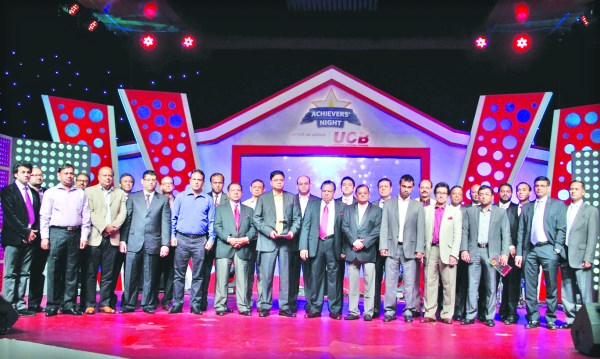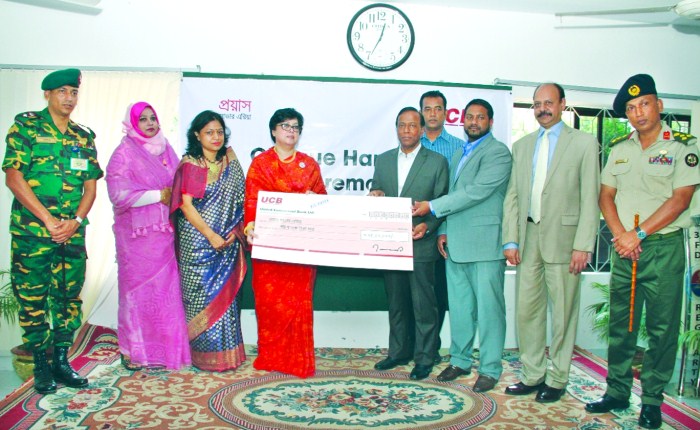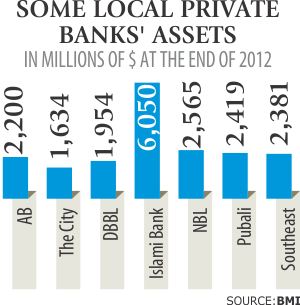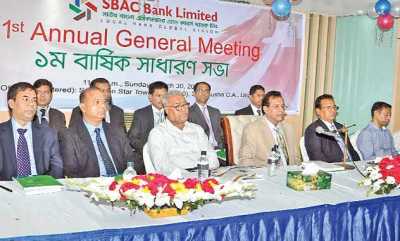United Commercial bank Limited organizes ‘Achievers’ night’

United Commercial Bank Limited organizes a grand customer get together named ‘Achievers’ night’ on 18 March 2014 at a local hotel in Dhaka. Chairman of UCB M A Hashem greeted all the valued clients for their trust and faith on UCB. Besides, Clients contributing in various fields were also honored by giving mementos in the event.
Moreover, honourable Managing Director of UCB Muhammed Ali said, UCB will extend its area of mutual cooperation in future through various schemes.
Among others honourable Vice-Chairman Sharif Zahir, honourable Chairman of Executive Committee Anisuzzaman Chowdhury, honourable Chairman of Audit Committee Lt. Gen. (Retd.) Abu Tayeb Muhammad Zahirul Alam, rcds, psc, honourable Chiarman of Risk Management Committee M. A. Sabur, honourable Directors namely Md. Jahangir Alam Khan, Md. Tanvir Khan, Asifuzzaman Chowdhury and Shabbir Ahmed along with various senior officials of UCB, valued clients and prominent business personalities of the country were present at the event.
United Commercial Bank Limited, the leading private commercial bank of the country has always been introducing banking practice in an innovative and client friendly way since its inception in 1983.
News:Bangladesh Today/5-Apr-2014UCBL donates to ‘Proyash’, a school for especially abled Children operated by 9th Infantry Division, Savar Cantonment

United Commercial Bank Limited (UCB) handed over a donation check of Taka 25,00,000/- (Taka Twenty Five Lac only) to ‘Proyash’, a school for especially abled Children operated by 9th Infantry Division, Savar Cantonment on 2 April 2014, by the authority reported.
Md. Jahangir Alam Khan, honourable director of UCB handed over the check to Begum Farzana Nigar, patron of Proyash Savar Area.
Among others honourable Director of UCB Md. Tanvir Khan, honourable Additional Managing Director of UCB Mirza Mahmud Rafiqur Rahman and Lieutenant General Chowdhury Hasan Sarwardy, Bir Bikram, ndc, psc along with other senior officials of UCB and various army personnel were also present at the hand over event.
United Commercial Bank Limited is the largest private commercial bank of the country. UCB is firmly devoted to all sorts of social causes and is actively practicing Corporate Social Responsibilities (CSR) as a core part of operation since its inception in 1983.
Government bank borrowing may exceed Tk40,000cr this FY
'local businesses and trade might face hurdles in getting commercial bank loans over the next four months because of extra government borrowing of around Tk15,000 crore'
Concerns have been raised within the finance ministry that government bank borrowing might exceed Tk40,000 crore in the current fiscal year because of a shortfall of revenue earning and an increase in the revised ADP.
The country fought all odds and prolonged political unrest to maintain a sound macro and fiscal economic situation during the last couple of years, but the strong position of the country might be lost, said a senior official of the finance ministry.
Seeking anonymity, the official also said local businesses and trade might face hurdles in getting commercial bank loans over the next four months because of extra government borrowing of around Tk15,000 crore.
The release of three tranches of Extended Credit Facility (ECF) of International Monetary Fund might also be halted unless the government complied with a condition of bank borrowing limit for the next nine months, sources said.
As per the IMF condition of ECF bank borrowing limit, the government will be able to borrow Tk24,000 crore until June 30, 2014, while an additional Tk10,000 crore may be borrowed from the banking system until December.
Sources said finance ministry officials tried to convince a visiting ECF review mission last week that the government would reduce the bank borrowing target to Tk24,000 crore from the Tk25,993 crore target set under the budget.
On Thursday, a meeting of the National Economic Council (NEC) set the revised Annual Development Programme (ADP) amount at Tk60,000 crore from the original ADP of Tk65,870 crore. Earlier, the finance minister and planning minister took confronting stances after the Finance Division directed the Planning Commission that the revised ADP outlay should not exceed Tk55,000 crore.
Officials present at the meeting quoted Finance Minister AMA Muhith as saying that revenue collection would see a deficit of Tk11,000 crore this year, while the ADP implementation was also slow.
Muhith also criticised the ministries that demanded additional fund without considering the reality. The ministries were less interested in spending foreign funds and keener on spending from government funds, he claimed.
The revised ADP should be Tk55,000 crore, Muhith said, adding that if more allocation was made, the extra amount would have to be borrowed from the banking system.
A finance ministry official said the revised budget had fixed revenue target at Tk125,000 crore, which was unlikely to be met and the shortfall would be Tk10,000 crore to Tk11,000 crore . The overall credit-deposit ratio in the banking sector decreased to 70.8% in December 2013 from 71.91% in November 2013. The credit-deposit ratio was 76.59% in December 2012 and 80.33% in June 2012.
If the slow revenue growth and the rising expenditure continued through to the second half, bank borrowing might cross the budgetary target of Tk25,993 crore, an National Board of Revenue official said.
Between July 1 last year and January 6 this year, bank borrowing stood at Tk5,931 crore, compared to Tk7,213 crore from the same period a year ago, according to central bank statistics.
In the first six months of the 2013-14 fiscal, the government received Tk3,857 crore from net sale of national savings certificate, which was only Tk177 crore in the same period of fiscal 2012-13
Former adviser to caretaker government AB Mirza Azizul Islam said the increase of revised ADP was a political decision, adding that the private sector credit crowding out would definitely hamper the country’s growth target and the investment situation.
The issue should therefore be properly examined before going for borrowing from the banking system, he added.
Abdus Salam Murshedy, director of Premier Bank Limited, told the Dhaka Tribune that the idle money of banking sector should be used properly so that it was not difficult to supply funds through bank borrowing.
However, the government policy measures and the existing investment situation in the country were still not in favour of the investors, he also said.
News:Dhaka Tirbune/5-Apr-2014
Bank assets go up on steady economic growth
 Analysts say asset quality of state banks undermines industry
Analysts say asset quality of state banks undermines industry
Sajjadur Rahman
A steady rate of economic growth -- on average 6.24 percent a year for the past one decade -- has helped Bangladesh raise its banking sector's assets faster than any other South Asian nations, bankers and analysts The total banking sector assets as a share of the country's gross domestic product (GDP) have also seen a dramatic rise -- from 50 percent in 2001 to 80 percent “Much of the credit for this goes to our entrepreneurs who have invested wisely in new mills, factories and also in the services sector,” Anis A Khan, managing director of Mutual Trust Bank, said.
Khan said banks and financial institutions have also expanded in terms of numbers, network, products and services, reaching huge swathes of the population.
London-based research firm Business Monitor International (BMI) found that total banking assets in Bangladesh witnessed a 19.1 percent compound average growth in the past five years followed by 18 percent in Sri Lanka, 17.2 percent in Pakistan and 16.7 percent in India.
At the end of 2013, assets of banks in Bangladesh stood at $107.1 billion compared to $88.8 billion in the previous year.
Bank assets are everything an individual bank owns -- loans and investments in stocks, bonds and treasury bills from which future paybacks are expected to occur. Loan quality and asset quality are the two terms with the same meaning.
Only the Indian banking assets as a share of its GDP are more (85 percent) than those in Bangladesh in the region, according to a recent report of the BMI.
For Pakistan and Sri Lanka, there was no change in their total banking assets relative to GDP, with both countries sitting at roughly 50 percent.
India is the leader in South Asian banking sector in terms of assets with more than $1,500 billion at the end of 2013, while Pakistan holds the second spot with $107.4 billion, up by only $300 million than that of Bangladesh. Banks in no other South Asian countries have even $40 billion worth of assets.
The BMI report forecast the total assets of Bangladeshi banks will surpass Pakistan by $3.5 billion to more than $125 billion at the end of this year.
Bankers and analysts attributed the asset growth to the steady economic growth of the country, expansion of financial institutions and entrepreneurs who have driven the demand for bank credit.
“Expansion of economic activities, from industries to SMEs, has helped us raise bank assets,” said Helal Ahmed Chowdhury, managing director of Pubali Bank that has around $2.5 billion worth of assets.
Shafiqul Alam, managing director of Jamuna Bank, said robust and consistent economic growth at more than 6 percent for the past one decade has pushed up the demand for credit in the country.
Muklesur Rahman, managing director of NRB Bank, credited the private sector for this growth in bank assets.
Rahman said garments, textile, spinning and services are Bangladesh's key trade and manufacturing sectors that are growing despite political hazards.
Monzur Hossain, a research fellow at Bangladesh Institute of Development Studies, said the rise in bank assets is consistent with the steady economic “It's a good sign for the economy. The private sector that drives the demand for credit has fared very well,” Hossain said.
Bankers also praised the central bank, particularly its governor, for its efforts to deepen financial inclusion, especially through agriculture, small and medium enterprises, women entrepreneurship and green banking that have acted as a fillip to the growth in bank assets.
On the quality of the assets, bankers and analysts have agreed that the condition of assets in state-owned banks is not good. They said many of their loans will not return and will become bad assets.
“It (asset) is a bit camouflaged and doesn't reflect the actual position of the banks,” Alam of Jamuna Bank, said about the overall banking industry's assets.
But Khan of Mutual Trust Bank said one has to remember that Bangladesh is constantly ravaged by challenges, some natural and some manmade, which both the entrepreneurs and the workforce have to face and “This had a resultant effect on repayments of loans and other obligations to banks,” he said.
News.The Daily Star/5-Apr-2014South Bangla Agri Bank holds AGM

South Bangla Agriculture and Commerce Bank organised the 1st Annual General Meeting (AGM) at the bank’s head office in Dhaka on Sunday.
SM Amzad Hossain, Chairman, South Bangla Agriculture and Commerce Limited was present as chief guest, said a press release.
Md. Rafiqul Islam, Managing Director and CEO of the bank delivered welcome speech at the function.



